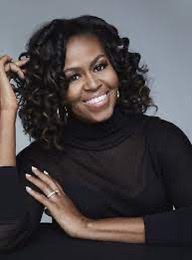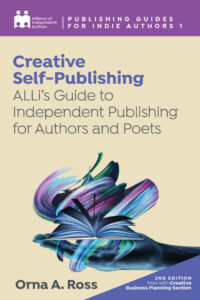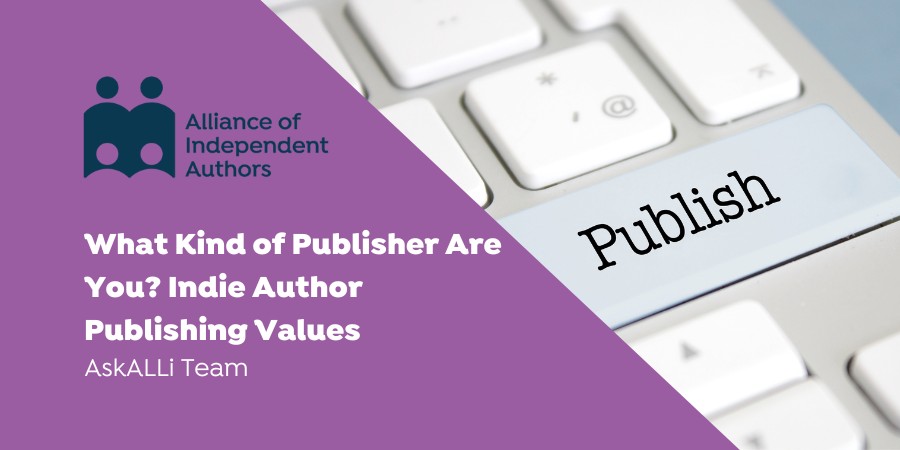Are you ready for 2023? Alliance of Independent Authors founder and director Orna Ross runs a Creative Planning for Profit program for indie authors and we kick off 2023 with an overview of the program, starting with the importance of publishing values to indie authors.
Welcome to 2023! On Friday next (6th January) I'll be running my annual Planning Workshop for authors and poets, based on the planning for profit program outlined in my book Creative Self-Publishing. You can find out more about the program here or sign up for a one-off workshop here.
In this blog series, I'll be giving you an introduction to this planning program that I devised for indie authors, based on my own needs and the experiences of thousands of indie authors I've worked with. I see every day how so many indie authors are working hard but, from a profit perspective, standing still, or barely inching forward. Their books are not selling. They don’t pay themselves a salary, they are unclear, stressed, confused or overwhelmed.
To make the necessary changes requires us to go deep. For an indie author, business development is self-development. So this is not conventional business planning. This is a unique, holistic program that:
- emphasises the links between your values as an author and the value you offer your readers
- draws deeply on your creative passion and mission as an author and as a publisher
- recognises that self-publishing authors must wear three very different hats: that of maker, manager, and marketeer
- incorporates creative rest and play into your weekly plans as well as creative work.
- encourages a growth mindset and pay-yourself-first policy
The program–and thus the post below–is full of exercises to do. It's not for everyone. If your writing and publishing is flowing well, then you already have an effective planning system. Carry on! But if you're struggling to publish or make a profit, then don't tell yourself you “don't have time” for creative planning. That's part of your problem.
A creative leap or breakthrough can often save us hours (sometimes even years) of working at a less powerful level that achieves less while asking more of us.
So find a pen and paper and go somewhere you won't be disturbed for about 90 minutes. Prepare to f-r-e-e-write, to open up and to go deep.
Your Writing and Publishing Values
The aim of the Creative Planning for Profit program is to draw on your innate creative capacity and empower you to create an integrated publishing business. This begins with understanding your values, which is closely connected to understanding the value you offer your reader. And getting clear about your publishing passion and mission.
When you work from your core values as an author and a publisher, you find your place among other people who think the way you do, care about what you care about, consume what you want to create.
It's not an exaggeration to say that for indie authors, publishing values are the foundation of success.
So if you're feeling overworked and underpaid, if you're running around doing. all. the. things, as the latest creative community catchline puts it, or if you're stuck, unsure where to go next, getting clearer about your publishing values is certain to help.
Everything becomes clearer. You enjoy a burst of creative energy. You feel ready to face fears and take risks. You can work with intent focus without feeling drained. You feel everything has been leading to here. You see more clearly where you want to go.
The Value of Knowing Your Values
Your values are filters. They focus you, enabling you to avoid detours and distractions, doubts and dithering. They keep your creative energies flowing in the right direction and ensure what you offer is uniquely you.
They guide you to your readers, fans and followers, your team and tools, your customers and influencers, your genre, niche and micro-niche. Knowing our values creates the framework within which we work, which helps us to choose the right business models and revenue streams, work with the right people in the right ways, and reach the right readers.
Core to any creative project is selection. Most creative people find they can do lots of things rather well. Most creative people are attracted to new and interesting things. All fine and completely lovely if you're creating for yourself, but if you want to sell your books to readers, focus is required.
Your reader needs to be crystal clear what kind of book(s) you're offering and what they can expect if they buy your book. Otherwise, they will ignore your books and move on to authors they trust to deliver what they want.
You also have the challenge of balancing your writing and your publishing tasks in a sustainable way, if you're going to reach enough readers to run a profitable publishing business.
Your Values as a Writer
If you write or read fiction, or watch movies or TV, you know how your characters’ life choices are shaped by a matrix of personal values. We all know that a person’s values tells us a lot about them and shapes how they live life. This is knowledge we can take, and should, take into our publishing.
Values aren’t just conceptually held—they guide and drive our actions. We decide what is good or bad, justified or illegitimate, worth doing or avoiding, based on possible consequences for our most cherished values. And so do our readers.
Whether they realise it or not, values underpin our readers’ emotional responses to our books. The particular words and images we choose convey the book’s values and affect and their decision-making and buying choices.
Knowing our values can aid us in a variety of ways as authors and publishers—easing decision-making, increasing our confidence, focusing our actions, and guiding us through when things get confusing or difficult.

Michelle Obama's top values are faith, hard work, excellence, love
In this commencement address at Jackson State University in 2016, Michelle Obama made a clear statement of the values that sustained her and her husband, Barack, as First Lady and President of the US. These values also lie at the heart of her self-help memoirs, Becoming and The Light We Carry.
When they go low, we go high. We choose faith. Faith in ourselves and the power of hard work. Faith in our God…
We choose love. Our love for our children. Our commitment to leaving them a better world. Our love for our country which has given us so many blessings and advantages. Our love for our fellow citizens: parents working hard to support their kids, men and women in uniform who risk everything to keep us safe, young people from the toughest background who never stop believing in their dreams…
And we choose excellence… No cutting corners, no taking shortcuts, no whining. We give 120% every single time, because excellence — excellence is the most powerful answer you can give to the doubters and the haters.
What Your Reader Values
Many book marketing experts suggest that publishers should create customer avatars for their ideal readers, establishing demographic and other socio-economic information about them—age, sex, income grouping and so on. On social media advertising platforms like Facebook and Instagram too, people are organized into male or female, where they are from and what age they are. Such factors are relevant but what’s more important is the emotional resonance generated by shared values.
Why should a reader buy your books, share your social media posts, follow you from your books to your website or vice versa? Why should they care? The answers lie in understanding why you care. Your values.
Once we understand which of our personal values we’re projecting in our books, and which values guide our readers’ decisions, we can draw these together more deliberately in our book production and marketing. Our covers, our book descriptions, our sell-sheets, our promotions can all reflect these shared values. This helps us to focus our efforts, drive better engagement, and turn casual browsers into true fans.
Connection around personal values is at the heart of every warm human relationship and the writer-reader relationship is no exception. Values, and the value you offer your readers, must be placed at the heart of your publishing business.
- Note Your Values. Download this Values Workbook With a pen and notebook to hand, read through them and write down any that feel important to you. Aim to note at least 50 out of the 150, the more the better.
- Add Other Values: Add any unlisted values that are important to you or f-r-e-e-write any thoughts about values prompted by the list.
- Select Your Top Seven Values. List the seven values that are most important to you. Look again. Make any changes you want and settle on a final seven.
- Order Your Values. Now list these in order of priority, with #1 being that which is most important to you, #2 the second most important and so on.
- My Values, My Story. F-r-e-e-write some parts of your life story, from a values perspective. How did those values came to be important to you. Mention other people, stand out situations, and breakthrough moments.
CONSIDER THIS: My Values, My Books Think about how these values are already reflected in your writing. Are there things there, in your writing, that you weren’t conscious of as you wrote? Then turn to your future writing. How might what you now know about your values shape your books to come?
Your Values as a Publisher
Your writing values spill into your publishing, particularly your book positioning and promotion, but when it comes to publishing, there are three core values to particularly note: productivity, connection and artistry.
I call these the core publishing values. All indie authors need to know where they position themselves in relation to these because these key values give us our publishing frameworks, the structure that underlies how we produce our books, how we market, and promote them, how we organize our teams, how we set up for profit, how we sustain ourselves, and how we scale.
These three publishing values are not mutually exclusive. We all want to sell more books, we all want to improve our creative expression, we all must please our readers to stay in business.
We need to value all three to a fair degree. We won't produce many books if we don't harness our creativity. We won't attract readers if our writing or publishing craft is underdeveloped. We won't grow creatively unless we're producing words and books regularly.
But a key question for every indie publishing is: which do we value most? Which of the three is our core publishing value?
Once we have decided, we will know which of three associated publishing frameworks we should opt for.
- If our top value is productivity, we are a volume publisher
- If our top value is connection, we are an engagement publisher
- If our top value is artistry, we are a craft publisher
It works in reverse too. If we find that we have been automatically leaning towards rapid release, we are likely a volume publisher and should organize around our top value of productivity. If we've been taking an age to tweak and perfect our words and our publishing craft, our top value is likely artistry and we should set up as a craft publisher and not try to publish too often or too quickly.
See Publishing Frameworks for more on this.
Publishing Values are Neutral and Equal
Publishing Values and Business Models
Once you've established your publishing values and framework, your choice of business model become clear. There are five main business models for authors:
- Exclusive Model
- Wide Model
- Rights Licensing Model
- Publisher Model
- Creator Model
Volume publishers may choose to use an exclusive or wide self-publishing model. Engagement publishers are more likely to choose a rights licensing or publisher model. And craft publishers often employ creator economy models with multiple income streams. But again, there are no rules, and indie authors are smashing it in a myriad of ways.
What that means for you is that you need to test, experiment, and explore to see what's right for you, your books, and your publishing business.
 Find out more about this and how it all hangs together in my book, Creative Self-Publishing.
Find out more about this and how it all hangs together in my book, Creative Self-Publishing.
If you would like more support, including regular workshops and a weekly accountability group, find out more about my Creative Planning for Profit Program here.






Thanks for writing this, Orna.
Writing-wise, I definitely fall into Camp Craft. I was a bit worried about indie publishing, since I’m not a fast writer, preferring to work with good critiquers and editors to develop the writing over several drafts before publication. For me, revisions are a major part of the fun of writing.
Interestingly, my blog and social media strategies are more engagement-based (I blog about children’s books as a children’s writer and create posts that are heavily slanted towards my gardens, where I grow my own food). I wouldn’t call myself ‘high-engagement’ but I’m definitely reader-focused in my approach, targeting an audience that’s likely to be interested in children’s books. My marketing strategies will probably more engagement-based, too.
Thanks again for a very thoughtful article.
I’m preparing to retire from a 20 year career as an Assistant Professor in Visual Communications at a community college. I have learned much about teaching, higher-education, producing, and I have things to say. I’m also a cartoonist and a web designer. That will fit into the mix somehow. Who doesn’t like a good cartoon?
I love working with people, but the academic treadmill has left me no room for my own personal creativity. Why? Because I’m responsible for the design and development of 6 courses and teaching 10 classes in the school year. So, my time is taken… mostly. Next stop? Self-publishing. At this moment, I see myself as a creative and want a creator publishing model. Let’s see where life takes me.
I think I’m in the craft category. I barely pulled off two books this year, I put a lot of time and money into editing and cover design. I have a small fan base from my fiction blog.
I just have no desire to overcharge readers for my books. I also respect the work of writers in other the other categories.
Thanks for writing this. It’s given me things to consider.